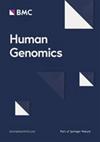Pharmacogenetics in Italy: current landscape and future prospects
IF 3.8
3区 医学
Q2 GENETICS & HEREDITY
引用次数: 0
Abstract
Pharmacogenetics investigates sequence of genes that affect drug response, enabling personalized medication. This approach reduces drug-induced adverse reactions and improves clinical effectiveness, making it a crucial consideration for personalized medical care. Numerous guidelines, drawn by global consortia and scientific organizations, codify genotype-driven administration for over 120 active substances. As the scientific community acknowledges the benefits of genotype-tailored therapy over traditionally agnostic drug administration, the push for its implementation into Italian healthcare system is gaining momentum. This evolution is influenced by several factors, including the improved access to patient genotypes, the sequencing costs decrease, the growing of large-scale genetic studies, the rising popularity of direct-to-consumer pharmacogenetic tests, and the continuous improvement of pharmacogenetic guidelines. Since EMA (European Medicines Agency) and AIFA (Italian Medicines Agency) provide genotype information on drug leaflet without clear and explicit clinical indications for gene testing, the regulation of pharmacogenetic testing is a pressing matter in Italy. In this manuscript, we have reviewed how to overcome the obstacles in implementing pharmacogenetic testing in the clinical practice of the Italian healthcare system. Our particular emphasis has been on germline testing, given the absence of well-defined national directives in contrast to somatic pharmacogenetics.意大利的药物遗传学:现状与前景
药物遗传学研究影响药物反应的基因序列,从而实现个性化用药。这种方法可以减少药物引起的不良反应,提高临床疗效,是个性化医疗的重要考虑因素。由全球联盟和科学组织制定的众多指南,对 120 多种活性物质的基因型驱动用药进行了编纂。随着科学界认识到基因型定制疗法比传统的不可知给药疗法更有优势,意大利医疗系统推动实施基因型定制疗法的势头也在不断增强。这一演变受到多个因素的影响,包括患者基因型获取途径的改善、测序成本的降低、大规模基因研究的增加、直接面向消费者的药物基因测试的日益普及以及药物基因指南的不断完善。由于 EMA(欧洲药品管理局)和 AIFA(意大利药品管理局)在药品说明书中提供基因型信息,但没有明确清晰的基因检测临床适应症,因此药物基因检测的监管在意大利已迫在眉睫。在本手稿中,我们回顾了如何克服障碍,在意大利医疗系统的临床实践中实施药物基因检测。与体细胞药物基因学相比,由于缺乏明确的国家指令,我们特别强调了种系检测。
本文章由计算机程序翻译,如有差异,请以英文原文为准。
求助全文
约1分钟内获得全文
求助全文
来源期刊

Human Genomics
GENETICS & HEREDITY-
CiteScore
6.00
自引率
2.20%
发文量
55
审稿时长
11 weeks
期刊介绍:
Human Genomics is a peer-reviewed, open access, online journal that focuses on the application of genomic analysis in all aspects of human health and disease, as well as genomic analysis of drug efficacy and safety, and comparative genomics.
Topics covered by the journal include, but are not limited to: pharmacogenomics, genome-wide association studies, genome-wide sequencing, exome sequencing, next-generation deep-sequencing, functional genomics, epigenomics, translational genomics, expression profiling, proteomics, bioinformatics, animal models, statistical genetics, genetic epidemiology, human population genetics and comparative genomics.
 求助内容:
求助内容: 应助结果提醒方式:
应助结果提醒方式:


